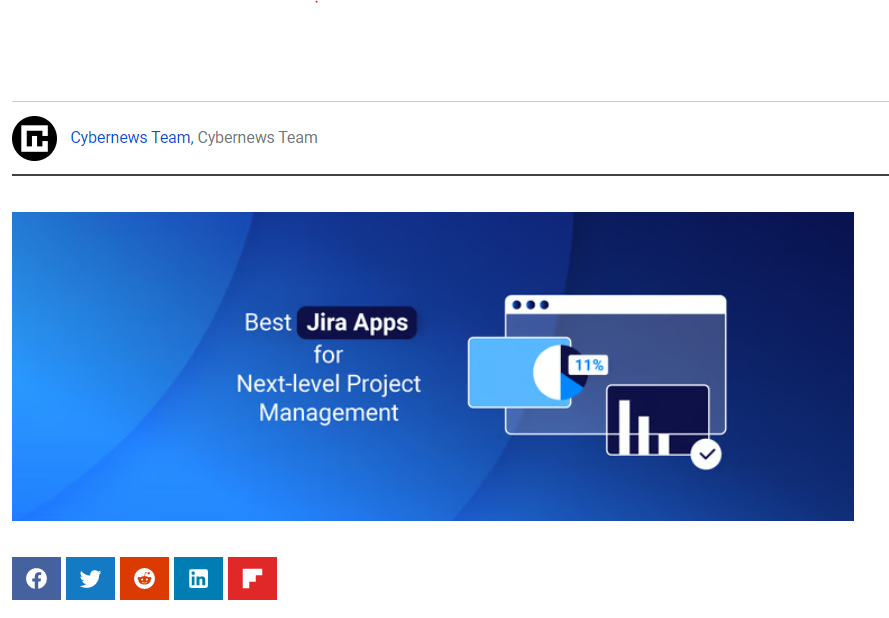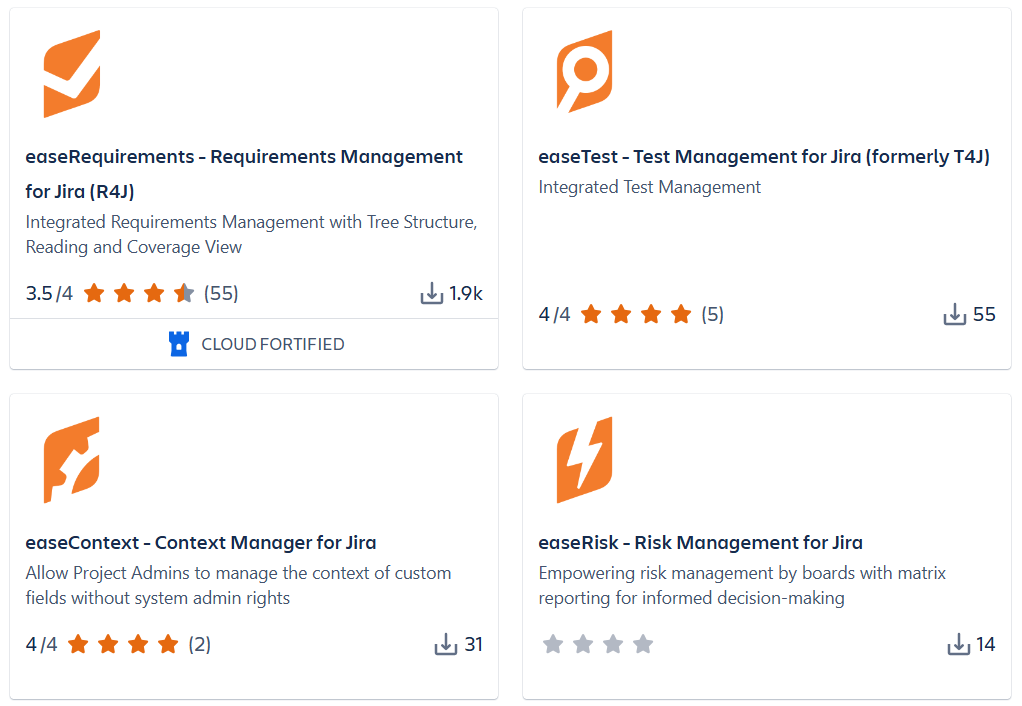· monday com · 7 min read
From Insights to Action: Transform Your Customer Data with monday.com Sales CRM

You’ve securely stored your customer contact forms, filed away your email exchanges, and forwarded your transactional data to your accounting department. How do you proceed now?
Certain enterprises may find themselves inundated with the volume of data they possess. But those adept at leveraging this data will unlock valuable insights into their customer base and develop highly tailored campaigns that yield remarkable outcomes. This post presents six methods for converting your customer data into effective marketing strategies, utilizing the monday sales CRM to centralize and organize all information seamlessly.
What is customer data?
Customer data refers to the various types of information that businesses gather about their clientele. This valuable data provides insights into customers’ identities, preferences, and behaviors, empowering marketers to tailor campaigns and even shape product development to meet customer needs.
Here are the key categories of customer data:
1. Personal data: This category encompasses personally identifiable information (PII) like names, addresses, email addresses, phone numbers, dates of birth, and banking details. Additionally, non-personally identifiable information (Non-PII) may include IP addresses or device IDs.
2. Engagement data: Engagement data reveals how customers interact with a brand’s marketing efforts. This includes metrics such as email open rates, click-through rates on sales pages, social media likes, and customer service feedback scores.
3. Transactional data: Transactional data focuses on customers’ purchasing behavior, including what products they buy, purchase frequency, the value of transactions, and preferred payment methods.
4. Behavioral data: This category delves into the specifics of the customer journey, such as the number of clicks made before adding an item to the cart, or the time spent on particular web pages. Such information is crucial for understanding how customers interact with marketing efforts and their preferences.
5. Psychographic data: Additional insights into customers’ hobbies, interests, values, and attitudes can facilitate personalized marketing campaigns tailored to individual preferences.
Six ways to leverage customer data for marketing
1. Enhance your understanding of customers: Successful businesses have a deep understanding of their target audience, which may evolve over time. For instance, your company might initially target young professionals before realizing that stay-at-home parents are also interested in your brand. By analyzing your data, you can segment each group and create distinct marketing campaigns tailored to their preferences.
Alternatively, you may observe a high rate of cart abandonment, a common occurrence in 70.19% of buyer journeys. By delving into behavioral data, you can identify and address prevalent pain points in your marketing strategy to boost conversion rates.
2. Develop strategic marketing initiatives: Effective marketing campaigns resonate with customers by delivering personalized messages and offerings. For instance, if your retail business sells footwear and fashion accessories, analyzing transactional and behavioral data enables you to provide personalized product recommendations.
For example, if a customer recently purchased shoes, you can send them personalized suggestions for matching accessories like bags or jewelry. This approach not only increases sales but also enhances the customer experience.
3. Optimize product and service innovation: Engaging customers in the development of new products fosters creative ideas that add value. When customers respond to surveys, interact with sales teams, or provide feedback, this data can shape the future of your offerings. Listening to customer input rather than making assumptions leads to more innovative products and services.
4. Enhance customer satisfaction and retention: Customizing marketing efforts and tailoring offerings based on data leads to higher customer satisfaction and loyalty. Research indicates that personalization is a key driver of customer loyalty, with 80% of frequent shoppers preferring brands that personalize their business operations.
5. Inform smarter decision-making: Utilizing historical customer data enables companies to anticipate future trends and make informed decisions. For instance, if you notice a significant sales spike in November preceding the holiday season, you can plan personalized marketing campaigns for the same period the following year.
6. Improve operational efficiency: Centralizing customer data in platforms like monday sales CRM facilitates access for multiple teams, enabling faster and more informed decision-making. For instance, sales teams can tailor their approach to potential clients using engagement data, while customer service teams can resolve issues promptly by accessing customers’ purchase histories.
Manage valuable customer data in monday sales CRM
monday sales CRM consolidates all your customer data into a centralized hub, empowering marketers, sales professionals, and business owners to oversee the complete sales process from pre- to post-sales. Below are the distinctive features that enhance the personalization of your marketing campaigns:
Tailored dashboard: With monday sales CRM, you can personalize your dashboard to display customer data in a manner that suits your preferences. Select from a range of options, including 27+ views, 36+ columns, and 25+ widgets, to present essential information at a glance. You can then delve deeper into specific details as needed.
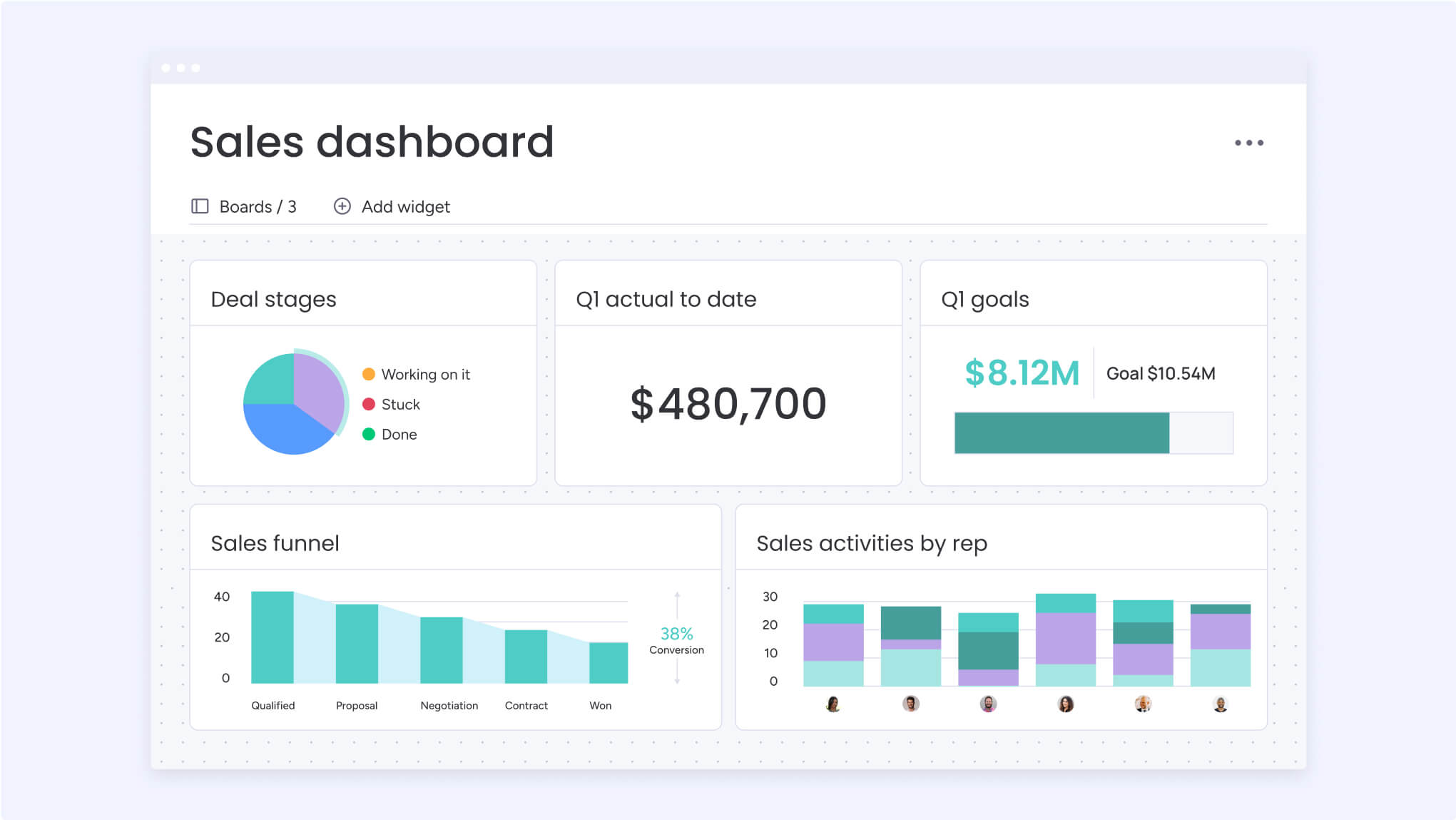
Team Collaboration: In order to comprehend customer needs and gauge responses to marketing initiatives effectively, it’s essential for sales, marketing, and product development teams to collaborate. With Monday sales CRM, your teams can convene to share crucial updates on board items or monitor significant email and Slack discussions, consolidating all communication channels into a single platform.
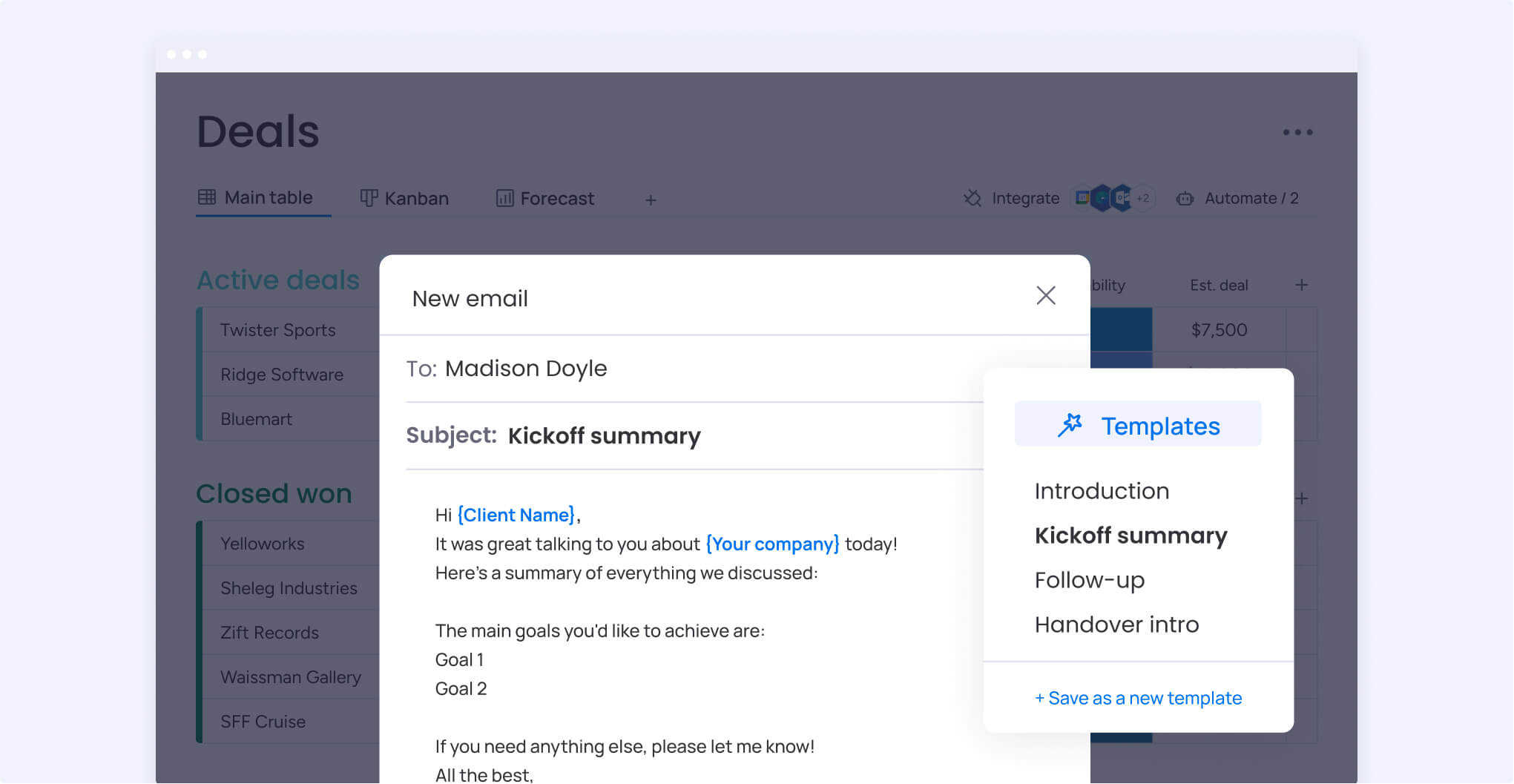
Lead Management: At the outset, every potential customer begins as a lead—a person expressing interest in your brand without making a commitment. monday sales CRM simplifies lead data capture through methods such as embedding forms on your website or receiving notifications when a lead engages with your emails or responds to your outreach efforts.
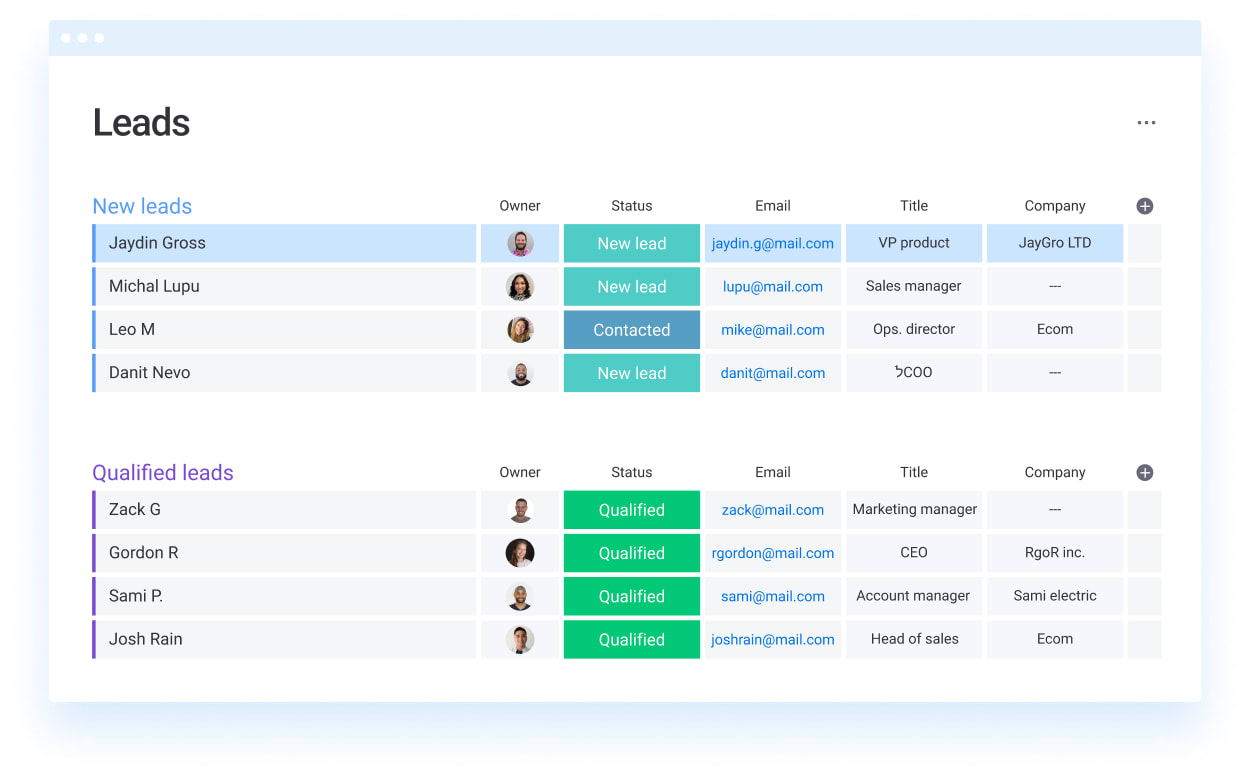
Monday AI: Our mass email feature simplifies the process of creating personalized bulk emails for specific segments of your customer base, substantially cutting down on your time investment.
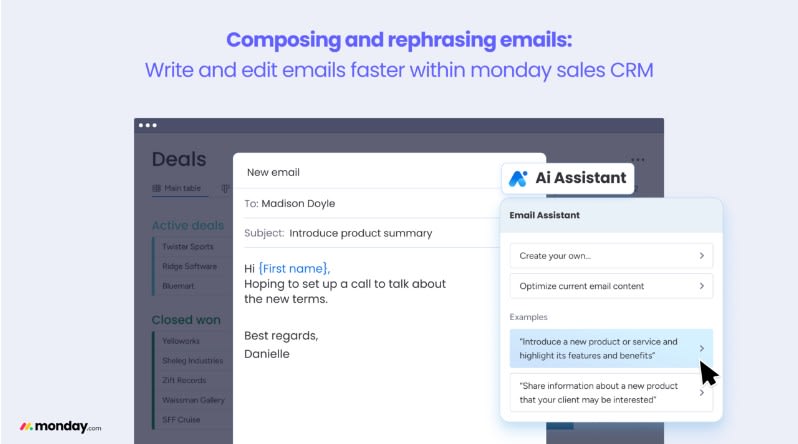
Integrations: Your customer data likely resides across various platforms, including email, CRM software, eCommerce, and social media platforms. monday sales CRM seamlessly integrates with over 72+ apps, allowing you to consolidate all this data into a single location. This unified data hub makes analysis and action more efficient and effective.
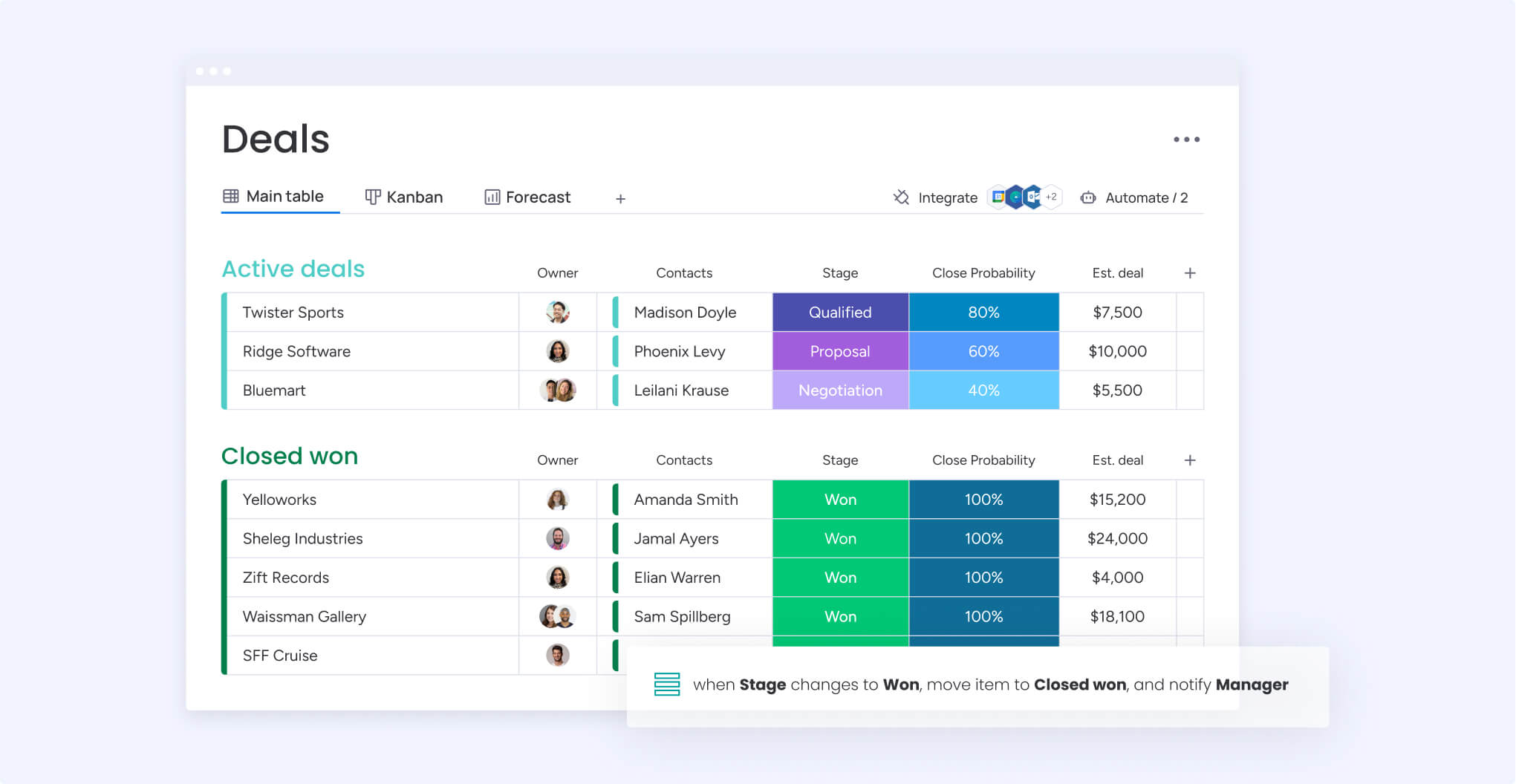
Australian real estate franchise Ray White switched to monday sales CRM after becoming frustrated with other customer relationship management platforms. Operations Manager Kyle Dorman explains:
“We were able to customize the CRM to fit the needs and requirements of our day-to-day activities. We ended up doing up to 1,300 automations and integrations which we could use to set out the next two to three years of automated emails, notifications and prompts to our team to follow up in certain steps. We’re doing that for 2,000 clients at the click of a finger.”
Ready to streamline your approach to customer data? monday sales CRM is a fully customizable platform with everything your teams need to appeal to your customer base.
Take the first step toward smarter, more data-driven marketing.
Get started for free today and experience how monday.com Sales CRM can transform your sales process!
Not sure where to begin? Contact us for a free consultation to help you maximize the platform’s potential for your business.
👉 Start Your Free Trial – No credit card required!
👉 Schedule Your Free Consultation & Demo
Your success story begins here. Let’s make it happen!

